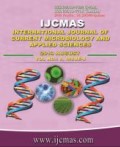


 National Academy of Agricultural Sciences (NAAS)
National Academy of Agricultural Sciences (NAAS)

|
PRINT ISSN : 2319-7692
Online ISSN : 2319-7706 Issues : 12 per year Publisher : Excellent Publishers Email : editorijcmas@gmail.com / submit@ijcmas.com Editor-in-chief: Dr.M.Prakash Index Copernicus ICV 2018: 95.39 NAAS RATING 2020: 5.38 |
Bio-fuels have caught global attention in the last decade. They are renewable liquid fuels made from biological raw materials and have proved to be good substitutes for petroleum in the transportation sector. Being environment friendly, bio-fuels like ethanol and bio-diesel can help us to conform to stricter emission norms. The present study was carried out with the objectives of analysing the major chemical constituents of waste corn collected from different locations, to optimize the fermentation variables for maximum yield of bioethanol using co-culture of Saccharomyces cerevisiae and Aspergillus awamori and evaluate the quality of bioethanol produced. The result analysed showed that the waste corn was found to contain good amount of carbohydrate source required for bioconversion into bioethanol. In this study for bioethanol production, main fermentation variables were optimized in solid state fermentation (SSF) and simultaneous Saccharification and fermentation (SiSF) methods using co-culture of Saccharomyces cerevisiae MTCC 170 and Aspergillus awamori MTCC 8840. The results of various experiments revealed that with the SSF technique, the highest yield of bioethanol (7.5%) using co-culture of Saccharomyces cerevisiae MTCC 170 and Aspergillus awamori MTCC 8840 was obtained at incubation temperature of 30°C after 168 hr of incubation period. In case of simultaneous Saccharification and fermentation (SiSF), the results of various experiments revealed that by employing co-culture of yeast and fungi the highest yield of bioethanol (6.5%) was obtained at a pH of 6.0 with incubation temperature of 30°C after 168 hr of incubation period. The results of various quality attributes of the bioethanol production showed that there were no major differences in values of density, viscosityof the bioethanol produced from both methods of fermentation.
 |
 |
 |
 |
 |